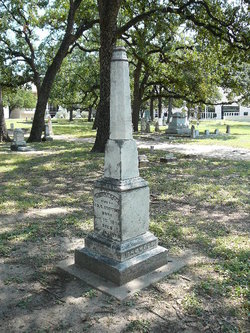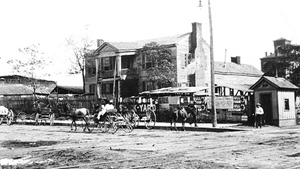
From Proud Heritage, Vol 1 by DCPA, not currently in print.
Edward Cabell Browder born May 30, 1825 in Missouri was listed in the 1850 census in Missouri as a 25 year old farmer. He migrated to the Peters Colony as a single man and was issued a land certificate by Thomas W. Ward in 1850 and patented 320 acres in Ellis County (Robertson, Third Class #1432). Jane Monroe Browder, his mother, who lived with him until her death in 1873, also had a land patent and was quite active in real estate developing and land trading.
Edward Cabell Browder and Elizabeth Coats were married in Dallas, Texas, by James A. Smith, M.G., on September 26, 1849. Elizabeth’s father was Samuel C. Coats, born 16 September 1802 in South Carolina, died 27 September 1874 in Mesquite, Texas, where he had extensive land holdings. Elizabeth’s mother was Nancy Jones born 25 December 1800 in South Carolina (a daughter of Joseph Jones, Jr., who married Mary Garner in 1823 or 1824 in Newberry County, South Carolina, according to records in Newberry County), died 25 March 1872 in Mesquite.
Elizabeth Coats was a descendant of a Revolutionary War patriot, Marmaduke Coats, and according to family tradition, was also descended from Pocahontas. The family took a great deal of pride in this connection, and for decades all daughters in the family were given “Pocahontas” as a second name; that is until Elizabeth came along. She decided the time-worn tradition had endured quite long enough, and should be phased out. She forthwith gave her four daughters more common middle names. Elizabeth was not quite 19 when she married Edward. Their children were: Pleasant (a son), Edward, Annie, Emily, Fannie, and Jane.
Pleasant born in 1853, married Ida Reese and had two children, Edward and Vivian. A son Edward, born in 1854, died by the time of the 1870 census. Annie, born in 1859, married Edgar Prickett and had two girls, Willie and lone. Emily, born in 1861, married Dr. J. H. MeCorkle. Fannie, born in 1864, married (1) G. M. Overlease and had one son Herbert, who was reared by her sister Annie, and married (2) George Pemberton. A fourth daughter, Jane, died at the age of four.
Soon after Edward Browder’s arrival from Missouri he was elected the first district clerk for the budding village of Dallas. He served in that capacity from 1850 until 1864 with a period out for service in the Confederate Army. During the War he was elected Captain of Company C, Eighteenth Texas Cavalry. At this time his friendship deepened with Richard Cooke “Father” Buckner, as Buckner prepared to take into his own home some of the children who were being orphaned by the hostilities. Edward took a lively interest in Buckner’s project. His daughters, Emily and Annie, were accustomed to devoting several days a week to the Home. They would ride side-saddle out to Mesquite where they would spend the day sewing for the children in the orphanage, then would ride back at the end of the day to their home at Browder’s Spring. From these modest beginnings grew the beloved and respected Buckner’s Orphan Home, now a Baptist facility.
Emily Browder and James McCorkle were married at Buckner’s Home by “Father” Buckner, as were Annie Browder and Ed Pickett.
Browder’s Spring was a lovely home site east of the Trinity River overlooking the little town of Dallas. Edward Browder would ride his horse to his office in Dallas proper taking the road that still bears his name, Browder Street. When Annie and Emily were little girls, their mother, Elizabeth, and their Aunt Lucy would wash clothes at the spring, rubbing and rinsing in the tubs on the banks of the pond, meanwhile putting the two little girls in another washtub floating on the water, first having carefully tied the makeshift ark to a tree with a length of rope so that it would not sail off downstream and empty the children into the Trinity River. The little girls were satisfied with the adventure of the ride, and the two mothers were left in peace to finish their laundry. Lucy was the wife of Edward’s brother, Isham Bell Browder.
Browder’s Spring played an important role in the development of Dallas in more ways than one. The First Methodist Church of Dallas, for instance, formed and held its first meeting in Edward Browder’s home, while the minister, William C. Young, was building his own home nearby. When no preacher was available, Edward was accustomed to taking the podium and delivering the sermon.
Edward was a surveyor who laid out the first chic suburb of Dallas, and soon his development, “The Cedars”, was opened to builders and settlers seeking the finest location in Dallas just before the railroads arrived in 1872 and 1873. Many years after his girls had all been duly christened without any reference to their distinguished ancestor, Edward perpetuated the name of his female antecedents by giving the name “Pocahontas” to one of the streets in his subdivision. The street was on the north side of present “Old City Park”, but now bears the name of Griffin East, a feeder into R. L. Thornton Freeway.
The Houston & Texas Central Railroad, running north and south, came to Dallas first in July, 1872; and with that important acquisition for progress, the leaders of the town realized that if they could entice the Texas & Pacific, running east and west, into coming thru Dallas, the bright future of the city would be assured. Ed Browder was entirely willing to supply the water necessary for the line. In order to circumvent the railroad’s going thru Corsicana or Hillsboro as previously announced, and thus passing about fifty miles south of Dallas, a sleight-of-hand was employed in the legislature. A rider was attached to the bill which allocated public lands to the railroad as an incentive for building the line, and this rider stipulated that the Texas & Pacific must cross the Houston & Texas Central within one mile of Browder’s Spring. The state legislature had no idea where Browder’s Spring was located, and by the time the deception was discovered it was too late to change the course of events. The Texas & Pacific came to town in August, 1873.
In 1869 Browder’s Spring became the principal water source for the city of Dallas and its 1500 inhabitants, delivering water through a wooden pipe line. Following the death of Edward C. Browder on March 24, 1878, and the death of his wife Elizabeth a mere seven weeks later on May 16, 1878, the approximately eight acres containing the springs were sold to a private water corporation, and subsequently, in 1881, were sold to the city of Dallas. The adjoining ten-acre city park was added to the 8.8 acre water property, and the first city-owned water system became a reality. White Rock Lake was the first city water reservoir, but before it could be completed the drought of 1910 struck. Though Browder’s Spring had been retired from active service by the completion of a dam on the Elm fork of the Trinity River, it was once again pressed into action and supplied 100,000 gallons of water daily to the parched city. White Rock Lake was ultimately completed and filled in 1911, and Browder’s Spring was permanently diverted and covered over, lying now under R. L. Thornton Freeway.

Edward Cabell Browder and Elizabeth Coats Browder are buried in the Masonic Section of the old Masonic and Odd Fellows Cemetery, located next to the Dallas Convention Center at Akard and Young. Their eldest son Pleasant Browder, “Brother Pesh”, was a harsh and domineering boy who, upon gaining his maturity, ultimately tricked his younger sisters out of part of their inheritance of extensive property in what is now downtown Dallas, including the site of the Adolphus Hotel, and was thus able to move to Wyoming and buy a successful ranching business as well as open a bank. The girls long remembered the time Pleasant arbitrarily seized his little sister Annie and spanked her for turning a cartwheel on her way to gather eggs from the henhouse for breakfast. When his parents died, finding himself the executor of the will. Pleasant sent his sisters off to school in Waxahachie, then liquidated the family holdings and left town a very rich man.
by Dr. Jack H. Hittson, Rockwall


